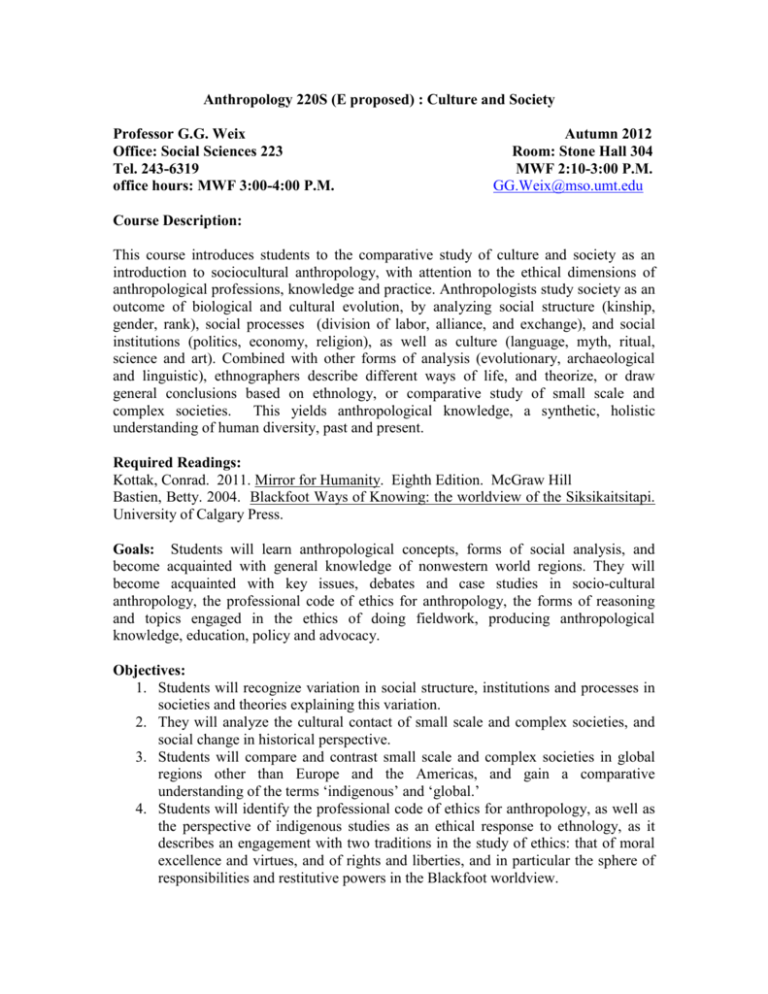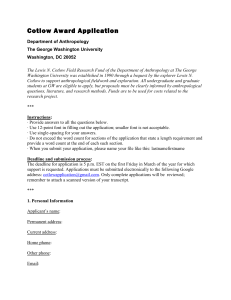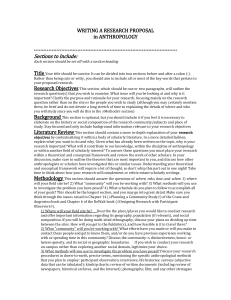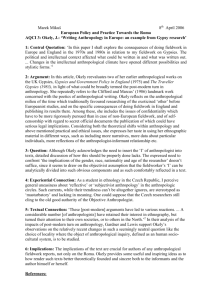Week Twelve: Globalization
advertisement

Anthropology 220S (E proposed) : Culture and Society Professor G.G. Weix Office: Social Sciences 223 Tel. 243-6319 office hours: MWF 3:00-4:00 P.M. Autumn 2012 Room: Stone Hall 304 MWF 2:10-3:00 P.M. GG.Weix@mso.umt.edu Course Description: This course introduces students to the comparative study of culture and society as an introduction to sociocultural anthropology, with attention to the ethical dimensions of anthropological professions, knowledge and practice. Anthropologists study society as an outcome of biological and cultural evolution, by analyzing social structure (kinship, gender, rank), social processes (division of labor, alliance, and exchange), and social institutions (politics, economy, religion), as well as culture (language, myth, ritual, science and art). Combined with other forms of analysis (evolutionary, archaeological and linguistic), ethnographers describe different ways of life, and theorize, or draw general conclusions based on ethnology, or comparative study of small scale and complex societies. This yields anthropological knowledge, a synthetic, holistic understanding of human diversity, past and present. Required Readings: Kottak, Conrad. 2011. Mirror for Humanity. Eighth Edition. McGraw Hill Bastien, Betty. 2004. Blackfoot Ways of Knowing: the worldview of the Siksikaitsitapi. University of Calgary Press. Goals: Students will learn anthropological concepts, forms of social analysis, and become acquainted with general knowledge of nonwestern world regions. They will become acquainted with key issues, debates and case studies in socio-cultural anthropology, the professional code of ethics for anthropology, the forms of reasoning and topics engaged in the ethics of doing fieldwork, producing anthropological knowledge, education, policy and advocacy. Objectives: 1. Students will recognize variation in social structure, institutions and processes in societies and theories explaining this variation. 2. They will analyze the cultural contact of small scale and complex societies, and social change in historical perspective. 3. Students will compare and contrast small scale and complex societies in global regions other than Europe and the Americas, and gain a comparative understanding of the terms ‘indigenous’ and ‘global.’ 4. Students will identify the professional code of ethics for anthropology, as well as the perspective of indigenous studies as an ethical response to ethnology, as it describes an engagement with two traditions in the study of ethics: that of moral excellence and virtues, and of rights and liberties, and in particular the sphere of responsibilities and restitutive powers in the Blackfoot worldview. Academic Policy: This course fulfills core and elective requirements for the following majors: Anthropology, Communication Studies and Native American Studies. It is also fulfills the General Education Social Sciences and Indigenous and Global perspectives (groups VI and X) and is proposed to meet the Ethics and Human Values (group VIII). As a lower division course, ANTY 220S should be taken by students who have earned 70 credits or less. Two midterm exams and one final exam will assess comprehension of anthropological vocabulary and concepts. The final exam is not cumulative. There will also be a portfolio of writing assignments: in class exercises, documentary films and optional readings and ethnographic fieldnote exercises. Grades are based on participation in class through attendance, examination of concepts and vocabulary, and written assignments. The grading scale is: 92% and above A, 8391% B, 74-82% C, 68-73% D, and below 67% F. +/- is at the discretion of the instructor. Grade policy: Midterm 1 (September 28) Midterm 2 (October 31th) Writing assignments (November 19th) Final exam (December 10-14th) 100 points 100 points 100 points 100 points 400 points Absences Policy: Lecture and exams are in Stone Hall 304, and attendance is necessary to pass the course. However, if you are sick, please stay home. Exams may be excused for serious illness or emergency, but an alternate essay exam must be taken within 10 days. If traveling to participate in UM athletic events conflicts with exams, student athletes must take the exam BEFORE departure. Students who miss the final exam due to illness or emergency must request an incomplete [I] for the course, and take an alternate essay final exam before January 23, 2013. Student Conduct Code: applies to this course and all exams. Plagiarism will not be tolerated, and will result in a failing grade on the specific assignment and/or the course. Disability accommodation: UM is committed to equal opportunity in education for all students, including those with documented physical, or learning disabilities. University policy states the responsibility of students with documented disabilities is to contact instructors during the first week to discuss appropriate accommodations that ensure equity in evaluation of classroom assignments and examination. Please contact DSS 2432372 at the Lommasson Center, room 154, for appropriate documentation. Syllabus Week One: Anthropological Knowledge: August 27 Introduction 29 Central concepts: Culture and Society 31 AAA Code of Ethics Reading: Chapters 1 and 2: What is Anthropology? What is Culture? In this week, the field of sociocultural anthropology is introduced, and the code of ethics for professional anthropologist is discussed. An exercise in class demonstrates the three aspects of the AAA code of ethics as it pertains to education, research, and advocacy for indigenous peoples. Week Two: Person, Time and Conduct: Doing Anthropology Sept. 3 Holiday Labor Day 5 Methods: Fieldwork 7 Enculturation, Socialization and Taboo Reading: Chapter 3 Doing Anthropology Bastien, Part II, Tribal Protocol and Affirmative Inquiry pp.35-76 In this week, the methods of sociocultural anthropology (participant observation and other forms of fieldwork) are introduced, and contrasted with the articulation of traditional knowledge, protocols, and inquiry. The ethical codes of the AAA, and the Blackfoot (as an example of indigenous studies) are compared for their principles and modes of reasoning to determine conduct in research settings. Week Three: Language 10 Language vs. Communication 12 Learning a culture 14 Language and Culture Reading: Chapter 4 Language Bastien, Blackfoot Pronunciation Key, Glossary (reference) In this week, the anthropological linguistics and sociolinguistics concepts and research are introduced, as they are foundational to ethnography and ethnology, and the specific examples of Blackfoot language are discussed as the foundation of ‘a way of knowing.’ Week Four: Livelihood 17 Bands and Foraging 19 Tribes and Shifting Cultivation 21 Chiefdoms and Surplus Reading: Chapter 5 Making a Living Bastien, Part I, Context pp. 1-34 “The Era of the Dog, or the Time of the Ancestors” “The Era of the Horse” In this week, the general theory of cultural evolution in sociocultural anthropology is introduced, with the primary example of the Blackfoot as a historical case study from the northern Plains cultures. The ethics of small scale societies are introduced as specific to the economy, forms of exchange, and values of nomadic peoples’ cultures and societies. Week Five: Economy 24 Economy and Exchange 26 Division of Labor and Social Structure 28 Midterm in class Most of the first midterm is objective questions to test concepts, vocabulary, and examples from class lectures, although there will be one short essay assignment on the AAA code of ethics, and the Blackfoot protocols for inquiry, to discuss the ethics of research and sociocultural knowledge about the anthropological subjects. Week Six: Polity: Big Men, Great Men, and the State October 1 Acephalous leadership and the ethic of generosity 3 Chiefs and the ethic of redistribution 5 The State Readings: Chapter 7 Political Systems Bastien, Part I, Context review final sections In this week, the institutions of politics and power are introduced, and the historical example of colonization of the Blackfoot by the U.S. government will be discussed as a historical case study of state intervention in small scale societies and sovereign nations on the Plains. Week Seven: Kinship, Marriage and Family 8 Kinship 10 Family and Household 12 Marriage Reading: Chapter 8 Kinship, Family and Marriage Bastien, Parr III, Affirmation of Indigneous Knowledge, section on kinship In this week, the foundational social structure of kinship in anthropological theory and ethnology is introduced, and the description of its grounding for all indigenous knowledge and ethical actions. Week Eight: Gender 15 Marriage, continued 17 Gender 19 Gender continued Reading: Chapter 9 : Gender Week Nine: Religion 22 Myth and Ritual 24 Ritual Specialists 26 Religion Reading: Chapter 10 Religion Bastien, Part III. Affirmations of Indigenous Knowledge, continued In this week, the foundational institution of religion is introduced, as it provides a primary locus for the discussion of human values and ethics in small scale societies. Week Ten: Colonialism 29 Proselytization, Conversion and World Religions 31 Midterm in class Nov. 2 Colonialism Reading: Chapter 11 World Systems and Colonialism Bastien, Part IV, Conclusion, Renewal of Ancestral Responsibilities as an Antidote to Genocide In this week, the historical context of colonialism is introduced, and its effects on anthropological knowledge and practice. The contrast with the sources on Blackfeet ways of knowing will focus on the autonomy and agency of social actors to respond to colonialism and its legacy through cultural innovations, linguistic revitalization of languages, and new forms of research protocols and anthropological knowledge that engage native subjects. Week Eleven: Race 5 Race and Ethnicity 7 Indigenous Studies 9 Holiday, Veteran’s Day Reading: Chapter 12: Race and Ethnicity In this week, cultural and social theories of race are contrasted with the new field of indigenous studies, as exemplified in Blackfoot ways of knowing. In particular, the social and cultural constructivist theories are introduced as the central theoretical paradigms for sociocultural anthropology in the last 50 years. Week Twelve: Globalization 12 What is globalization? 14 What are global issues for anthropology? 16 What new ethical issues arise? Reading: Chapter 13: Anthropology in a Globalized World In this week, globalization is introduced as a new context for the study of indigenous peoples and small scale societies. In particular, specific ethical topics and debates are discussed that rely on fundamental concepts in anthropology, i.e. ethnocentrisim, tolerance, cultural pluralism, relativism (cultural vs. moral), and the impliciations for both knowledge and advocacy or policy. Week Thirteen: Globalization, continued 19 exercise on the ethics of globalization 21 Student Travel Day 23 Holiday Thanksgiving In this week, students engage in an exercise (discussion and writing in class) on specific questions regarding the ethical challenges of globalization. The aim is to encourage identifying the ethical reasoning at work in positions, e.g. ritual scarification in gender initiation, arranged marriage, polygamy, bilingual education, as examples to make anthropology relevant to the 21st century. Week Fourteen: Review 26 Sociocultural anthropology: as a social science 28 Rethinking ‘indigenous’ and ‘global’ 30 Articulating the ethical reasoning in Blackfoot ways of knowing Reading: Review readings In this week, students are encouraged to review the readings for the course, and to return to the general issues and questions of what makes anthropology a social science, linking empirical case studies to theory, the comparative aspects of studying global and indigenous peoples, and a review of the ethical dimensions of Blackfoot ways of knowing as a response to the experience of colonialism. Week Fifteen: EthicsTopics: Review Dec. 3 Ethnocentrism vs. tolerance and cultural pluralism 5 Cultural vs. moral relativism 7 Conclusion and course evaluation In this final week, the central challenges of anthropological concepts are reframed as questions beyond the discipline, and the stress is on the ways both anthropological analysis and ethical reasoning can be combined to understand everyday life in a pluralist and multicultural world. Final Exam: during the week of December 10-14 (2 hours, including inclass essay)







